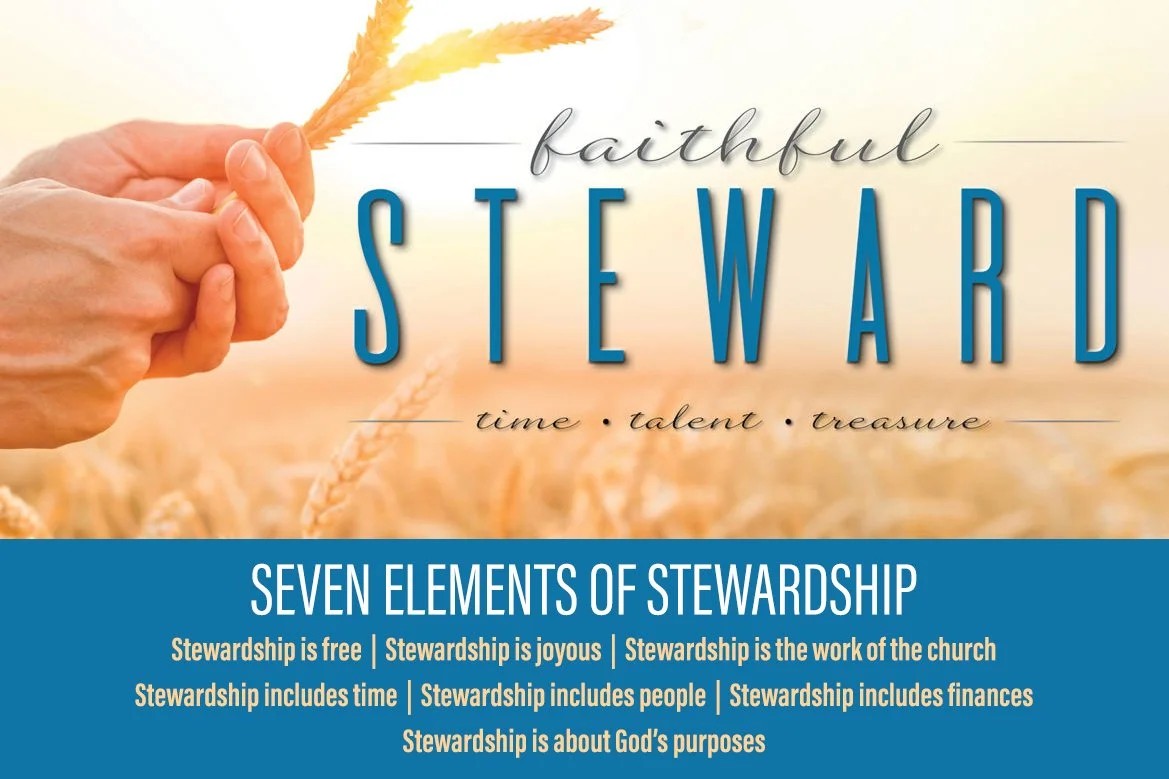Seven Elements of Stewardship
The LCMS has defined stewardship as “the free and joyous activity of God’s family — the church — in managing life’s resources for His purposes.” Here are seven elements of stewardship:
Stewardship is free.
This means is it without compulsion. While Scripture speaks of the tithe, to turn it into law is to miss the point! Stewardship is not a system of taxation used by the church to survive and pay the bills. Stewards are created in the image of God to manage creation, and redeemed and reconciled to God by the blood of Jesus to be stewards of ministry of the Gospel. However, our stewardship is not our creation. It is the Holy Spirit at work in and through us. This is what makes it truly free. We are simply conduits of the work of the Spirit as we steward the work of the Gospel through the local congregation, district, and Synod.
Stewardship is joyous.
There isn’t anything sad about doing what we were created to be and do. The faithfulness which the Spirit works in us is used to bring and keep people in the faith. The cheerful giver of whom Paul speaks in 2 Corinthians rejoices not in what he does, rather in what the Lord does through him.
Stewardship is the work of the church.
Stewardship is more than just a “me and Jesus” thing. While each person and family are led by the Spirit to set aside what they give on the first day of the week, when it is done in the setting of the Divine Service the Body is working together for the sake of the Gospel. Like the human body, stewardship is so much more than the sum of its parts.
Stewardship includes time.
Time is the single most finite resource entrusted to the individual steward. No amount of timesaving, productivity-increasing strategies will ever add one moment to the week entrusted to the steward. The church and the individual steward must faithfully manage this most finite of resources.
Stewardship includes people.
Individual Christian stewards are the ones who have that finite resource of time entrusted to them. It is crucial that the local congregation is faithful in its management of the time of every member of the Body of Christ. If we invest time and effort in things that do not flow from our true purpose of the stewardship of the Gospel, we are not being faithful. This will rob our people of their freedom and their joy. For this reason, it is critical that WHAT the congregation does and HOW they do it all flows from a knowledge of WHY they are placed there by the Lord of the Church.
Stewardship includes finances.
This is indeed the least finite of the resources entrusted to the steward and to God’s family of the church. I learned this lesson firsthand from a faithful Lutheran farmer decades ago. My wife and I were looking at purchasing land and building a house. When we approached a member about purchasing a section of long abandoned pasture on which we would build, the response came, “Pastor, we love you. But we can always make more money. God’s not going to make any more dirt.” Congregations can always find ways to increase what comes into the congregation in offerings and be more faithful with what is already entrusted. While it is critical that we are indeed faithful with what is entrusted, we dare not make the least finite resource the biggest deal!
Stewardship is about God’s purposes.
This is what sets Christian stewardship apart from any other kind of stewardship. Worldly stewardship flows from fear. If we are not faithful in our stewardship of the air, water and land, fear says we are going to die! But the Christian steward seeks to be faithful in every aspect of creation because it was created by God and redeemed in the blood of Jesus. Our stewardship flows not from fear but from faith. This faith is driven by the promise of God’s purpose. God’s purpose is that the church’s faithful stewardship be an instrument of His purpose that all people come to the knowledge of the truth and be saved. Our stewardship of the Gospel is central and instrumental in this!
God made us for this stewardship. We failed. In Christ He has redeemed and restored us to this task. We don’t deserve it in any way. But we are free. This freedom is the initiation of our joy. This joy is what leads us to be faithfully active as stewards of all that God entrusts to us for the sake of the Gospel and the benefit and salvation of our neighbor.
– Mike Kroeger, Elder
Distilled from an article by Nathan Meador in The Lutheran Witness, Mar 7, 2024

